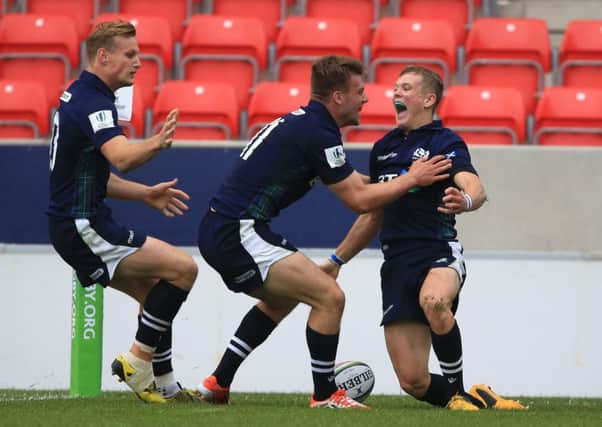Allan Massie: It was a pleasure to watch winger Darcy Graham


Actually, we have been improving at under-20 level for a bit now, first with Sean Lineen as coach and now with Dalziel. In one sense, Dalziel has been fortunate. He has had more players with some experience of the professional game in the Pro12 and even the English Premiership than his predecessors have enjoyed. Thanks to the demands of the World Cup last autumn his captain Scott Cummings enjoyed a run of games for Glasgow and did very well in them. Zander Fagerson has not only started frequently for Glasgow, but got his first full cap as a late substitute in the Six Nations, while Jamie Ritchie has played regularly for Edinburgh. So has the full-back Blair Kinghorn, while Adam Hastings and Andrew Davidson have also had full pro experience. This makes a difference, evident in the later stages of the under-20 Six Nations, when pro calls very evidently weakened Dalziel’s side. Defence may rarely win matches, but it staves off defeat and, most of the time, the Scottish defence was very good. Some first-up tackles were missed but there was almost always someone on hand to repair the damage. There were more handling errors from both sides than might have been expected, partly on account of aggressive defence, partly because the ball may have been slimy.
It is very unfortunate that Hawick wing Darcy Graham’s tournament has been ended by concussion as the highlight of the game was undoubtedly his try, a thing of beauty, reminiscent of the kind of try that Chris Paterson used to score: see space, accelerate light-footed, go for the try-line. In these days when so many wings are built like large locks or No 8s it was a joy to see one who relies on pace, vision and the ability to change direction to dance past tacklers and leave them flat-footed. Power is doubtless important for a wing these days, but speed remains essential. Young Graham is not only a winger to look out for, but one whom it is a pleasure to watch.
Advertisement
Hide AdAdvertisement
Hide AdDalziel is remaining commendably level-headed. Beating Australia is good, very good, but will be of real significance only if it is backed up by further victories. England come next, eager for revenge after losing 24-6 to Scotland in the junior Six Nations. They have a stronger squad in this tournament, some players then required by their Aviva Premiership clubs now being available. I saw only the second half of their match against Italy, when they looked fast, skilful and powerful, just what you would expect.
The step-up from age-group to full international rugby can be a short one – as Zander Fagerson already knows. Of the present England XV it is not long since Anthony Watson, Jack Nowell and Maro Itoje were playing in the Junior World Cup. The transition may, however, be easier in England than in Scotland, and this is the worry. It may be easier, first, simply because there are 12 professional sides in the Aviva Premiership, while we have only two in Scotland; and, secondly, because the English Premiership clubs run second XVs which play meaningful matches and also frequently farm out players to the professional Championship sides. There’s nothing comparable in Scotland and one attempt to bridge the gap for a few players – the SRU’s tie-up with London Scottish, who play in that Championship, has fallen through and abruptly abandoned. Turning out from time to time for club sides here isn’t an adequate substitute.
The next two or three years are vitally important for the development of under-20 internationalists. Admittedly, given the length of international careers these days, it is always likely that only a few of even the best under-20 sides will go on to have a senior international career – even though the number of international matches now played, and the number of players out injured at any time, means that more are capped than used to be the case. Nevertheless, without a better structure for career development than we have now, it’s all but certain that a good many junior internationalists will not fulfil their potential. Given the potential shown by Dalziel’s squad this would not only be sad, but something we can’t afford.